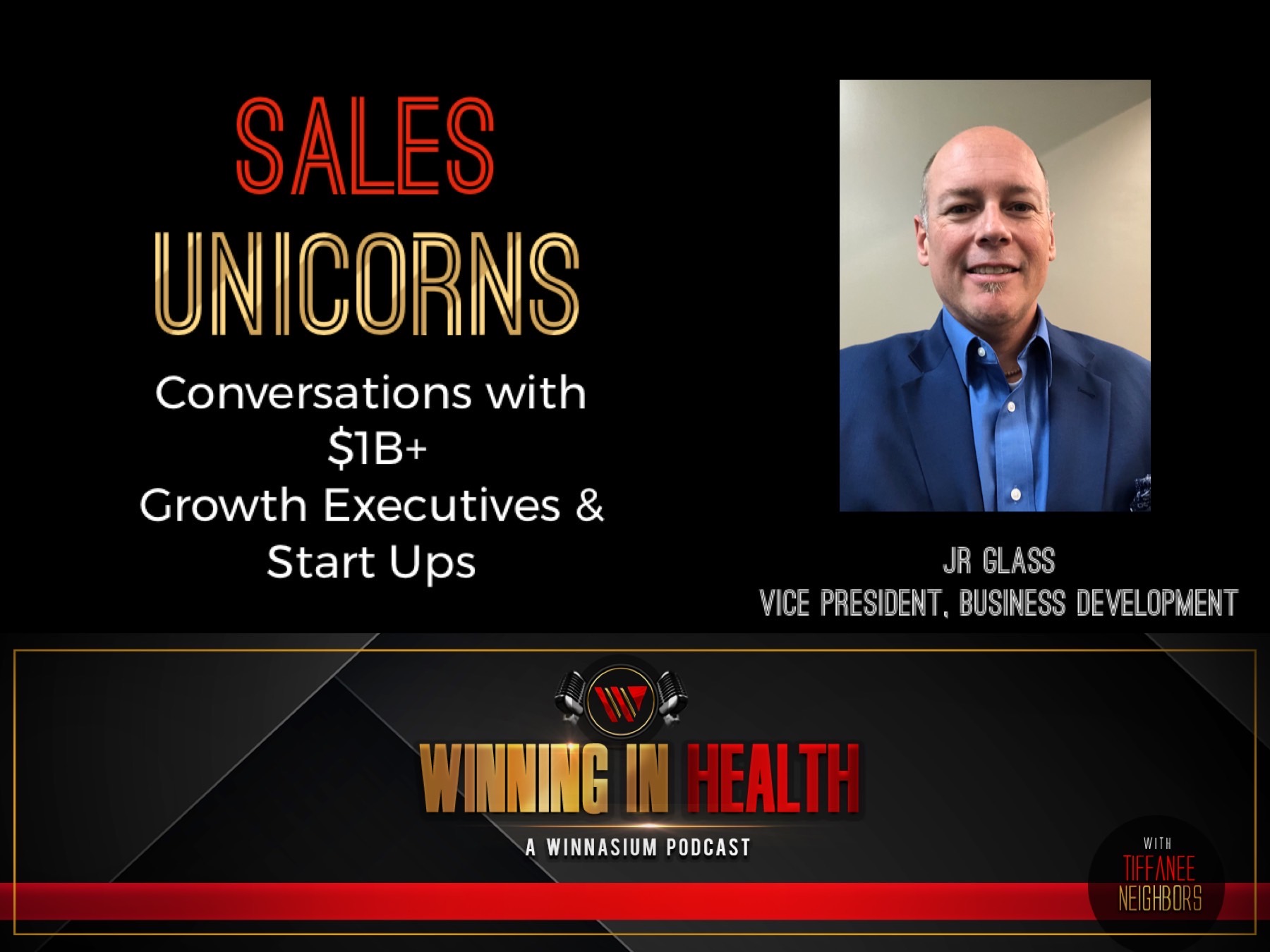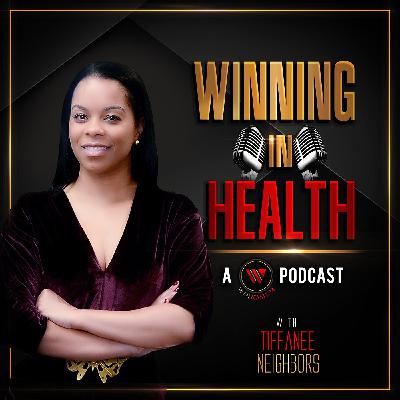Episode #15 - $ales Unicorn Series - The Path to $1B+
Description
Host: T Neighbors 00:43
Welcome to the Winning in Health podcast in this new series we're connecting with high performing growth executives in roles such as Managing Director and Vice President of Sales and Business Development that have achieved $1 billion in sales revenue during the course of your careers. What's remarkable about these individuals is that they've achieved these numbers, not as managers of the team or even through a single large transaction, but as individual contributors who have had multiple deals that comprise this total revenue. At WINNASIUM we study high performers and seek to learn from their extraordinary success. In this series our guests will help us expose the secrets behind their exceptional performance.
Host: T Neighbors 01:30
In this interview, episode 15 - we will interview JR Glass, Vice President of Business Development with one of the largest government Health IT contractors in the federal contracting space. Today JR will discuss his career progression and we will glean and capture lessons on how he prepares and competes to achieve the results obtained over the course of his career.
Guest: JR Glass 01:54
Well, thank you very much, Tiffanee. Thanks for having me.
Host: T Neighbors 01:57
This series is super exciting because it takes us back to the core of what Winning and Health is all about. It's really about capturing these lessons of sales performance and high performance in business, particularly in the health space and JR that's the bulk of where you've spent your sales career. Is that correct?
Guest: JR Glass 02:15
Yes, that is correct. I've been supporting federal health clients now for, geez, my professional career is about 23 years, but in business development for the last 12
Host: T Neighbors 02:26
That's quite commendable for you to achieve such numbers in just almost 12 years when you really narrow down the time spent in sales. You know, sales is not something that we intend to do, right? Business development, sales. I kind of use those interchangeably. Can you tell us a little bit about how you entered the Business Development/Sales profession and how your career has progressed?
Guest: JR Glass 02:50
That's a bit of a loaded question. I feel like I'm blessed to be where I am, but it was not by design, so I come from delivery. I've been a consultant in the federal space for, like I said, for over 20 years. I progressed through project leadership and became a project director and I was the Director of healthcare programs for a small 8a, a business that was doing business at the Centers for Medicare and Medicaid Services. A lot of small businesses, anyone that's growing at all, everybody's responsible for growth and so it just kind of worked out that I found myself working on a lot of different proposals. We had one vice president for business development who took a liking to me, took me under his wing and said, for better or worse, Hey, I want this guy to come work for me, and my leadership said to me, how would you like the opportunity to do business development full time?
Guest: JR Glass: 03:44
We had been very successful. We grew the company from about 50 people to about 200 in a span of about a year and a half. We were going to grow and I needed a Deputy, this opportunity was presented to me to go and do business development full time. And I said, well, um, I know how to deliver, I know what success looks like from delivery so it was an opportunity for me to learn and to learn how to get business in the first place. So with my career I've always looked for new opportunities to learn new and exciting things. So I did that and that's kind of how I ended up in business development. And it's been a wild ride ever since.
Host: T Neighbors: 04:22
That's interesting. And you know, it's kind of consistent kicking off this series we interviewed an author and the book that’s pretty funny in terms of its title, but it's really a business book for children - it's about wanting to be in sales when you grow up. And of course there's the play on that, right? No one really by design interests, sales though that is changing. And we talk about that in that prior episode, episode 14 but you mentioned two things that I'd like to make sure we capture, which is that there was someone who mentored you and that you also kind of had experience in an environment where you had to do everything. You mentioned the term 8a and of course for those in the audience who aren't familiar with the government space, that's a small business, almost the equivalent of a startup in the commercial world. Can you tell us a little bit about that particular growth experience where you had, as you said, experience growing that organization or contributing to growth from an employee base of 50 to 200 so with mentorship included and that prior experience delivering that opposite side of the sales process, what do you attribute to your success in that moment?
Guest: JR Glass 05:31
Oh wow. So that's a great question. It's interesting how many times people have asked me that question like, Hey, how did you guys grow that company so quickly? Because by the time I switched to business development full time, we had grown from 50 to 200 by the time I left several years later we were at about 800 employees, so we had 40% year over year growth. And I attribute that success in a large to the hard work of a lot of people. You know, I jokingly used to say when you're at a small business, you're chief cook and bottle washer, so you kind of have to do everything. There was no real formal process that we were following. It was loosely based on the Shipley method of business development and capture and proposals, but we were kind of figuring out as we went along and I had a very aggressive leadership that were very all in for bidding, lots of opportunities. So we bid everything. We were bold, we were unconstrained, and we went after a lot of different things that were not necessarily in our core set of offerings. As a company, as you might imagine, when you're a 50 person company, people say, well, what kind of company are you? And we say, well, we'll be whatever you want to.
Guest: JR Glass 06:47
You know, we can prove it to you. As we started getting more programs under our belt and we were hiring the right people that knew how to deliver those programs, we earned the trust of our client and they said, Hey, you know, if we're going to go to a small business and they have many that they can choose from, they knew the company that I was working for could deliver for them. They brought real resources that understood their business and they could deliver effectively. And I think that that was in large part, a major contributor to our ability to win new business. The past is prologue. You gotta be able to say that you can deliver because there's nothing worse than going in and convincing a client to trust you and give you some work and then you screw it all up and then it looks bad.
Guest: JR Glass 07:30
From a business development perspective. And just in general. And you know, I came from the delivery side of the house. So I was already managing all the people trying to make the projects that we had one, be profitable because it was my experience at the time that these BD people didn't know what the heck they were doing. They would say, ah, you know, I don't need a project manager on this project. And then we went at and I'd say, okay, who's the project manager? And I say, well, we didn't bid one. And I use that as an extreme example, but I think that the owner of the company recognized, Hey, you know, this guy comes from delivery, he's pretty smart. Let's make sure that we have this guy doing business development so that we can be profitable on all the things that we went. It's













